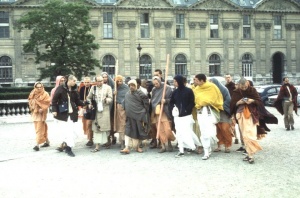CC Antya 6.314 (1975)

A.C. Bhaktivedanta Swami Prabhupada
Below is the 1996 edition text, ready to be substituted with the 1975 one using the compile form.
TEXT 314
- ātmānaṁ ced vijānīyāt
- paraṁ jñāna-dhutāśayaḥ
- kim icchan kasya vā hetor
- dehaṁ puṣṇāti lampaṭaḥ
SYNONYMS
ātmānam—the soul; cet—if; vijānīyāt—one understands; param—supreme; jñāna—by knowledge; dhuta—thrown off; āśayaḥ—material desires; kim—what; icchan—desiring; kasya—what; vā—or; hetoḥ—for reason; deham—the material body; puṣṇāti—maintains; lampaṭaḥ—debauchee.
TRANSLATION
“‘If one’s heart has been cleansed by perfect knowledge and one has understood Kṛṣṇa, the Supreme Brahman, he then gains everything. Why should such a person act like a debauchee by trying to maintain his material body very carefully?’”
PURPORT
This verse (SB 7.15.40) was spoken by Nārada to Yudhiṣṭhira Mahārāja regarding a householder’s liberation from material bondage. On the spiritual platform, one does not unnecessarily care for the body. Śrīla Narottama dāsa Ṭhākura has said, deha-smṛti nāhi yāra, saṁsāra bandhana kāhāṅ tāra. One who is spiritually situated does not think that he is the body. Therefore he can transcendentally execute severe penances in the renounced order of life. The best example of such renunciation is Raghunātha dāsa Gosvāmī.